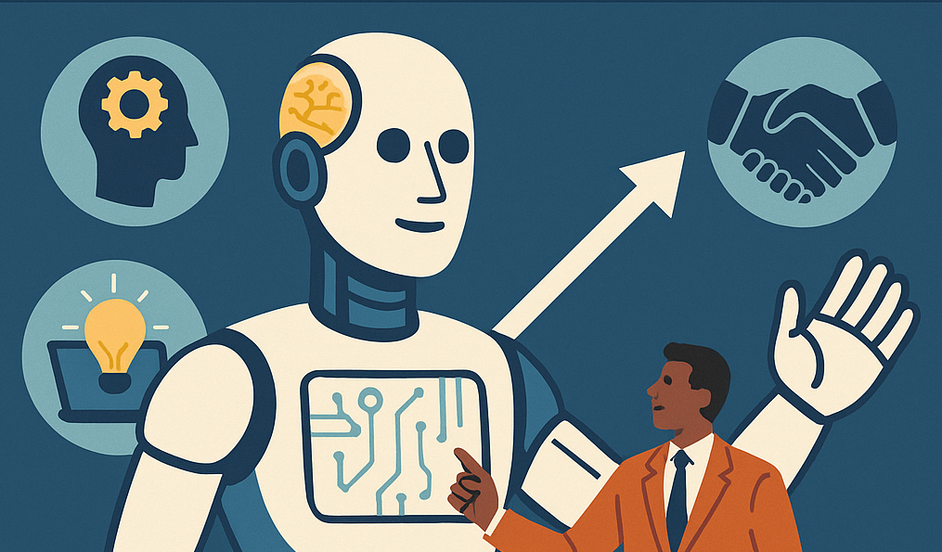The Inevitable AI Revolution: Why Every Professional Must Adapt
In today’s rapidly evolving technological landscape, AI career transformation has become not just a possibility but an inevitability that every professional must prepare for. According to renowned entrepreneur and investor Vinod Khosla, “Almost certainly, with no doubt, there isn’t a job where AI won’t be able to do 80% of all jobs.” This startling prediction represents a fundamental shift in how we think about professional development and career planning.
The traditional career model that guided previous generations—specializing in one field, climbing the corporate ladder, and building expertise over decades—is being completely disrupted by artificial intelligence. What makes this AI career transformation so revolutionary is that it’s not just changing how we work; it’s redefining what work means and who can perform it.
Understanding the Scope of AI Career Transformation
The 80% Rule: What AI Will Replace
The most critical insight about AI career transformation is understanding what Khosla calls “the 80% rule.” Within the next three to five years, AI will be capable of performing 80% of most jobs currently done by humans. This includes everything from basic administrative tasks to complex analytical work, creative content generation, and even some forms of decision-making.
This AI career transformation means that professionals can no longer rely on specialized skills alone. The value of being an expert in a single field is diminishing rapidly, as AI can acquire and apply that expertise more quickly and consistently than any human. The key to surviving this transformation is not competing with AI but learning to work alongside it effectively.
The New Professional Paradigm: Adaptability Over Specialization
AI career transformation requires a fundamental shift in how we approach professional development. Instead of becoming specialists in narrow fields, professionals must become generalists who can adapt quickly to new challenges and learn rapidly in any domain. Khosla emphasizes that “the single most important thing that matters is not specialization in an area. I learn the ability to learn, be able to move around rapidly as the world evolves and learn rapidly.”
This new paradigm means that education is no longer about acquiring specific knowledge but about developing the capacity to learn and adapt. The most valuable skill in the age of AI career transformation is the ability to think from first principles and apply that thinking to any new problem or domain.
The Three Pillars of AI Career Transformation Success
Pillar One: Embracing Lifelong Learning
The first essential component of successful AI career transformation is developing a genuine love for learning that extends throughout your entire career. Khosla notes that at age 70, he’s “learning at a much faster pace than I’ve ever learned in my whole life.” This commitment to continuous learning is not optional in the AI era—it’s essential for survival.
Professionals must cultivate the ability to jump into any new area, whether it’s a physics problem, a biology challenge, or a financial analysis, and quickly develop competence. The good news is that AI tools like ChatGPT can accelerate this learning process dramatically, making it possible to acquire new skills and knowledge faster than ever before.
Pillar Two: Developing AI Collaboration Skills
AI career transformation is not about competing with artificial intelligence but about learning to collaborate with it effectively. The professionals who will thrive in this new environment are those who can leverage AI tools to enhance their own capabilities rather than viewing them as threats.
This means developing skills in prompt engineering, understanding AI capabilities and limitations, and learning how to integrate AI tools into your workflow. The most successful professionals will be those who can use AI to handle routine tasks while focusing their human creativity and judgment on higher-level strategic thinking and innovation.
Pillar Three: Building Strategic Thinking Capabilities
In the age of AI career transformation, strategic thinking becomes more valuable than ever. While AI can perform many tasks more efficiently than humans, it still struggles with long-term strategic planning, understanding complex human motivations, and making decisions that require deep contextual understanding.
Professionals must develop the ability to think strategically about their careers, their industries, and the broader technological landscape. This means understanding not just what AI can do today, but where it’s heading and how to position yourself to take advantage of emerging opportunities.
Hiring AI-Ready Professionals?
Post jobs for free with WhatJobs and connect with professionals who excel at implementing effective AI career transformation strategies. Find candidates with adaptability, a learning mindset, and strategic thinking.
Post a Job for Free →The Entrepreneurial Opportunity in AI Career Transformation
Identifying AI Disruption Opportunities
AI career transformation creates unprecedented opportunities for entrepreneurs who can identify areas where AI can obsolete existing services or create entirely new value propositions. Khosla advises entrepreneurs to ask themselves: “Where can I apply AI that obsoletes the service, either in cost or in performance or in quality that somebody is providing without AI, and beat them at it?”
This approach requires thinking strategically about which industries are ripe for disruption and which companies are most vulnerable to AI-powered competition. The entrepreneurs who succeed in this environment will be those who can see opportunities that others miss and execute on them effectively.
Building AI-First Companies
The most successful companies in the age of AI career transformation will be those built from the ground up to leverage artificial intelligence effectively. This means designing business models that take advantage of AI’s capabilities rather than trying to retrofit AI into existing processes.
These AI-first companies will be able to operate with fewer employees while delivering superior products and services. Khosla predicts that “sometime in the next 10 years, we will see a company with a billion dollars of revenue that has only 10 employees.” This represents a fundamental shift in how we think about business scale and efficiency.
Preparing for the AI Career Transformation: Practical Steps
Assessing Your Current Position
The first step in preparing for AI career transformation is honestly assessing your current professional situation. Are you in a role that’s likely to be heavily automated by AI? Do you have skills that complement AI capabilities rather than compete with them? Are you positioned to take advantage of new opportunities created by AI disruption?
This assessment should include both your technical skills and your strategic positioning within your industry. The goal is to identify areas where you can add unique value that AI cannot replicate and areas where you need to develop new capabilities to remain competitive.
Developing Your Learning Strategy
AI career transformation requires a systematic approach to continuous learning. This means identifying the skills and knowledge areas that will be most valuable in the AI era and developing a plan to acquire them. It also means staying current with AI developments and understanding how they might impact your field.
The most effective learning strategies in this environment focus on developing transferable skills—abilities that can be applied across multiple domains and industries. These include critical thinking, problem-solving, creativity, emotional intelligence, and strategic planning.
Building Your Network and Support System
Navigating AI career transformation is not something you can do alone. Building a strong network of professionals who are also adapting to this new reality is essential for staying informed about opportunities and getting support during challenging transitions.
This network should include both peers in your current field and professionals in emerging AI-related industries. It should also include mentors who can provide guidance based on their experience with technological disruption and career transitions.
The Future of Work in the AI Era
The Rise of the Generalist
AI career transformation is creating a new professional archetype: the strategic generalist. These professionals have broad knowledge across multiple domains and the ability to quickly develop expertise in new areas as needed. They can see connections between different fields and apply insights from one domain to solve problems in another.
The strategic generalist is not a jack-of-all-trades but a master of learning and adaptation. They have deep expertise in how to acquire new knowledge and skills quickly, and they can apply this expertise to any domain they encounter.
The Importance of Human-Centric Skills
While AI can perform many technical tasks more efficiently than humans, there are certain skills that remain uniquely human and will become increasingly valuable in the age of AI career transformation. These include creativity, emotional intelligence, strategic thinking, and the ability to understand and work with complex human systems.
Professionals who can combine these human-centric skills with effective AI collaboration will be the most valuable and sought-after workers in the new economy. They will be able to use AI to handle routine tasks while focusing their human capabilities on areas where they can add unique value.
The New Definition of Success
AI career transformation is also changing what success means in professional life. Traditional metrics like job titles, salary levels, and years of experience are becoming less relevant than adaptability, learning ability, and the capacity to create value in new and innovative ways.
Success in the AI era is more about continuous growth and adaptation than about achieving specific milestones. The most successful professionals will be those who can thrive in uncertainty and use change as an opportunity for growth rather than a threat to their security.
Overcoming Common Obstacles in AI Career Transformation
Managing Fear and Uncertainty
One of the biggest challenges in AI career transformation is managing the fear and uncertainty that comes with such dramatic change. Many professionals worry that AI will make their skills obsolete or that they won’t be able to compete in the new environment.
The key to overcoming these fears is to focus on the opportunities that AI creates rather than the threats it poses. While AI will eliminate some jobs, it will also create new ones and transform existing roles in ways that can be beneficial for those who adapt effectively.
Developing the Right Mindset
AI career transformation requires a fundamental shift in mindset from one of specialization and stability to one of adaptability and continuous learning. This can be challenging for professionals who have built their careers around deep expertise in specific areas.
The key is to recognize that while your specific knowledge may become less valuable, your ability to learn, adapt, and create value in new ways will become more valuable than ever. This requires letting go of attachment to specific skills or roles and embracing the opportunity to develop new capabilities.
Finding the Right Opportunities
In the age of AI career transformation, identifying the right opportunities becomes more complex and more important. You need to be able to distinguish between temporary disruptions and fundamental changes, between opportunities that will last and those that will quickly disappear.
This requires developing strong analytical and strategic thinking skills, as well as staying informed about technological developments and their potential impact on different industries and roles.
Frequently Asked Questions
Q: How do I know if my current job is at risk from AI career transformation?
A: AI career transformation affects most roles, but those involving routine tasks, data processing, or predictable decision-making are most vulnerable. Focus on developing skills that complement AI rather than compete with it, such as creativity, strategic thinking, and human interaction.
Q: What’s the best way to prepare for AI career transformation while maintaining my current job?
A: Start by developing your learning agility and AI collaboration skills. Take online courses in AI tools, practice prompt engineering, and identify ways to integrate AI into your current workflow. Build transferable skills that will be valuable across multiple industries.
Q: How can I identify opportunities created by AI career transformation?
A: Look for industries and companies that are slow to adopt AI, as they represent opportunities for disruption. Focus on areas where you can apply AI to improve efficiency, reduce costs, or enhance quality. Network with professionals in emerging AI-related fields to stay informed about new opportunities.
Q: What if I’m not interested in technology? Can I still succeed in the AI career transformation era?
A: Yes, but you’ll need to develop some level of comfort with AI tools and understand how they can enhance your work. Focus on developing human-centric skills like creativity, emotional intelligence, and strategic thinking that AI cannot replicate. The key is learning to collaborate with AI rather than competing against it.






